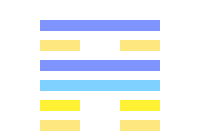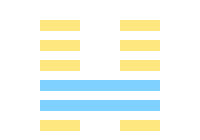56.2.4.6 (56 > 46)

56.2.4.6 (56 > 46) - THE LÜ HEXAGRAM.
- 2. The second line, divided, shows the stranger, occupying his lodging-house, carrying with him his means of livelihood, and provided with good and trusty servants.
- 4. The fourth line, undivided, shows the traveller in a resting-place, having (also) the means of livelihood and the axe, (but still saying), ‘I am not at ease I in my mind.’
- 6. The sixth line, undivided, suggests the idea of a bird burning its nest. The stranger, (thus represented), first laughs and then cries out. He has lost his ox(-like docility) too readily and easily. There will be evil.
56.2.4.6 (56 > 46) - Searching
One makes the others look like ignorant by teaching them the ropes.
Bing DeepL Google Yandex56.2.4.6 (56 > 46) - Searching
One makes the others look like ignorant by teaching them the ropes.
Bing DeepL Google Yandex56.2.4.6 (56 > 46) - Lu, le voyageur
Lu : voyageur, hôte, étranger, loger ; bon arrangement.
- 2. L’étranger qui s’est établi quelque part doit y déposer tous ses biens et se procurer des serviteurs jeunes et habiles ; il lui arrivera bonheur.
- 4. Il peut s’être établi quelque part, y avoir ses biens et sa hache, mais son cœur n’est point encore à l’aise et en sûreté. (Il n’a point une situation assurée, il doit veiller.)
- 6. L’oiseau détruit son nid ; l’étranger ambulant rit d’abord, puis pousse de hauts cris, parce qu’il perd son bœuf ; ainsi, trop aisément, un changement amène un mal.
56.2.4.6 (56 > 46) - Chercher
On fait passer les autres pour des ignares en leur enseignant les bases du métier.
Bing DeepL Google Yandex56.2.4.6 (56 > 46) - Keresés
- 2. Találkozik valakivel aki segíteni szeretne.
- 4. Védi magát a többiektől, nem teszi jól.
- 6. Meggondolatlanság elfogadni megbeszélés nélkül.
The trigrams
The trigrams are combinations of three yin and yang lines. The three bottom lines of the hexagram form the lower trigram and represent the inner situation. The three top lines form the upper trigram and represent the outer situation.
Upper trigram: The fire The earth


Lower trigram: The mountain The wind


The formation: 56
What is already there

56 - THE LÜ HEXAGRAM.
Lü intimates that (in the condition which it denotes) there may be some little attainment and progress. If the stranger or traveller be firm and correct as he ought to be, there will be good fortune.
Bing DeepL Google Yandex56 - Lu, le voyageur
Lu : voyageur, hôte, étranger, loger ; bon arrangement.
Lu « bon arrangement ». Avec un faible commencement, le bon arrangement conduit au succès, à la consolidation, au bonheur.
Texte
L’étranger ambulant prospère difficilement. S’il est juste et droit, il aura une heureuse fortune.
Symbolisme
Le feu au-dessus d’une montagne. Ainsi le grand et sage fait briller sa droiture en appliquant les lois pénales et ne laisse pas durer les différends et les procès.
Commentaire
Si le faible acquiert, maintient sa droiture chez les étrangers et reste soumis au fort, il sera stable et attaché à la claire vérité. Ainsi l’étranger nomade, faible au commencement, prospérera et s’affermira s’il est droit et juste.

56.2 (56 > 50) - THE LÜ HEXAGRAM.
The second line, divided, shows the stranger, occupying his lodging-house, carrying with him his means of livelihood, and provided with good and trusty servants.
Bing DeepL Google Yandex56.2 (56 > 50) - Believing without evidence
One meets a person who is well disposed towards one.
Bing DeepL Google Yandex56.2 (56 > 50) - Believing without evidence
One meets a person who is well disposed towards one.
Bing DeepL Google Yandex56.2 (56 > 50) - Lu, le voyageur
Lu : voyageur, hôte, étranger, loger ; bon arrangement.
L’étranger qui s’est établi quelque part doit y déposer tous ses biens et se procurer des serviteurs jeunes et habiles ; il lui arrivera bonheur.
Bing DeepL Google Yandex56.2 (56 > 50) - Croire sans preuves
On rencontre une personne bien disposée envers nous.
Bing DeepL Google Yandex
56.4 (56 > 52) - THE LÜ HEXAGRAM.
The fourth line, undivided, shows the traveller in a resting-place, having (also) the means of livelihood and the axe, (but still saying), ‘I am not at ease I in my mind.’
Bing DeepL Google Yandex56.4 (56 > 52) - Losing legitimacy
When one defends oneself from others, one sees that things are not going well.
Bing DeepL Google Yandex56.4 (56 > 52) - Losing legitimacy
When one defends oneself from others, one sees that things are not going well.
Bing DeepL Google Yandex56.4 (56 > 52) - Lu, le voyageur
Lu : voyageur, hôte, étranger, loger ; bon arrangement.
Il peut s’être établi quelque part, y avoir ses biens et sa hache, mais son cœur n’est point encore à l’aise et en sûreté. (Il n’a point une situation assurée, il doit veiller.)
Bing DeepL Google Yandex56.4 (56 > 52) - Perdre sa légitimité
En se défendant des autres, on voit que ça ne va pas.
Bing DeepL Google Yandex
56.6 (56 > 62) - THE LÜ HEXAGRAM.
The sixth line, undivided, suggests the idea of a bird burning its nest. The stranger, (thus represented), first laughs and then cries out. He has lost his ox(-like docility) too readily and easily. There will be evil.
Bing DeepL Google Yandex56.6 (56 > 62) - Being light-headed
It is imprudent to accept without discussion.
Bing DeepL Google Yandex56.6 (56 > 62) - Being light-headed
It is imprudent to accept without discussion.
Bing DeepL Google Yandex56.6 (56 > 62) - Lu, le voyageur
Lu : voyageur, hôte, étranger, loger ; bon arrangement.
L’oiseau détruit son nid ; l’étranger ambulant rit d’abord, puis pousse de hauts cris, parce qu’il perd son bœuf ; ainsi, trop aisément, un changement amène un mal.
Bing DeepL Google YandexIn the making: 46
What is poised to happen

46 - THE SHĂNG HEXAGRAM.
Shăng indicates that (under its conditions) there will be great progress and success. Seeking by (the qualities implied in it) to meet with the great man, its subject need have no anxiety. Advance to the south will be fortunate.
Bing DeepL Google Yandex46 - Shâng, l’ascension
Shāng : monter, s’élever, prospérer, grandir.
Shang « monter, s’élever ». Les commencements se développant, le grand homme apparaît. S’il va en avant sans souci, sans fausse inquiétude, il aura le bonheur. Comm. : le grand condescendant, vertueux, amasse les biens ; le petit s’élevant, devient grand.
Texte
[left]Quand les commencements heureux grandissent, apparaît l’homme vraiment grand.
[/left]
Symbolisme
Un arbre croissant au milieu de la terre figure Shàng, « monter ». Ainsi l’homme supérieur, s’attachant à la vertu, accumule les petits mérites, pour la rendre grande et élevée.
Commentaire
Le petit en son temps peut s’élever. Le fort condescendant et doux garde le milieu et agit convenablement (envers le petit). De là naît grande prospérité. Ainsi l’homme vraiment grand se manifeste. Il est loué de tous, ses desseins réussissent.
The nuclear hexagram: 28.1.3.5 (28 > 54)
The nuclear hexagram is the association of the two inner trigrams (lines 2,3,4 and 3,4,5). It represents the root, or the origin of the situation.

28.1.3.5 (28 > 54) - THE TÂ KWO HEXAGRAM.
- 1. The first line, divided, shows one placing mats of the white mâo grass under things set on the ground. There will be no error.
- 3. The third line, undivided, shows a beam that is weak. There will be evil.
- 5. The fifth line, undivided, shows a decayed willow producing flowers, or an old wife in possession of her young husband. There will be occasion neither for blame nor for praise.
28.1.3.5 (28 > 54) - Losing control
When one is frivolous one does not care about the future of one's children.
Bing DeepL Google Yandex28.1.3.5 (28 > 54) - Losing control
When one is frivolous one does not care about the future of one's children.
Bing DeepL Google Yandex28.1.3.5 (28 > 54) - Tá kvoh, le grand excès
Tá kvoh : 1. Grand excès, défaut, manquement ; 2. Traverser, dépasser.
-
1. Ceci est susceptible de deux explications : a. « S’appuyer sur des joncs » est un grand défaut ; ils plient et ne soutiennent pas. b. Pour placer un objet comme natte à offrande, se servir de mao blanc est fautif.
Note. Au lieu de gratter simplement la terre et l’aplanir.
(Le mao blanc représente la pureté, la droiture, kiet tche. Ceci d’après le commentaire représente un excès de précaution. Kwéh hu weï shin (1er sens). - 3. Une poutre, un pilier trop faible (voir texte I) sont mauvais (ils ne peuvent supporter) (grand défaut).
- 5. Un vieux saule produisant une fleur, une vieille femme épousant un homme encore jeune, quoique non blâmables, ne peuvent être loués. La fleur du vieux saule ne peut durer, l’époux d’une vieille femme peut s’en dégoûter. (Faits qui passent les règles ordinaires.)
28.1.3.5 (28 > 54) - Perdre le contrôle
Quand on est frivole on ne se soucie pas de l'avenir de ses enfants.
Bing DeepL Google Yandex28.1.3.5 (28 > 54) - Lemondás
- 1. Fejlődni akar a gyengeség miatt.
- 3. Ápolja kapcsolatait.
- 5. Igyekszik javítani mielőtt mások észrevennék a hanyatlást.
Ruler
The starting situation

56.6 (56 > 62) - THE LÜ HEXAGRAM.
The sixth line, undivided, suggests the idea of a bird burning its nest. The stranger, (thus represented), first laughs and then cries out. He has lost his ox(-like docility) too readily and easily. There will be evil.
Bing DeepL Google Yandex56.6 (56 > 62) - Being light-headed
It is imprudent to accept without discussion.
Bing DeepL Google Yandex56.6 (56 > 62) - Being light-headed
It is imprudent to accept without discussion.
Bing DeepL Google Yandex56.6 (56 > 62) - Lu, le voyageur
Lu : voyageur, hôte, étranger, loger ; bon arrangement.
L’oiseau détruit son nid ; l’étranger ambulant rit d’abord, puis pousse de hauts cris, parce qu’il perd son bœuf ; ainsi, trop aisément, un changement amène un mal.
Bing DeepL Google YandexCorrection
The direction where the ruler is going to bend

56.2.4 (56 > 18) - THE LÜ HEXAGRAM.
- 2. The second line, divided, shows the stranger, occupying his lodging-house, carrying with him his means of livelihood, and provided with good and trusty servants.
- 4. The fourth line, undivided, shows the traveller in a resting-place, having (also) the means of livelihood and the axe, (but still saying), ‘I am not at ease I in my mind.’
56.2.4 (56 > 18) - Searching
One may venture in strange places to never return.
Bing DeepL Google Yandex56.2.4 (56 > 18) - Searching
One may venture in strange places to never return.
Bing DeepL Google Yandex56.2.4 (56 > 18) - Lu, le voyageur
Lu : voyageur, hôte, étranger, loger ; bon arrangement.
- 2. L’étranger qui s’est établi quelque part doit y déposer tous ses biens et se procurer des serviteurs jeunes et habiles ; il lui arrivera bonheur.
- 4. Il peut s’être établi quelque part, y avoir ses biens et sa hache, mais son cœur n’est point encore à l’aise et en sûreté. (Il n’a point une situation assurée, il doit veiller.)
56.2.4 (56 > 18) - Chercher
On peut s'aventurer dans des endroits étranges pour ne jamais revenir.
Bing DeepL Google Yandex56.2.4 (56 > 18) - Keresés
- 2. Találkozik valakivel aki segíteni szeretne.
- 4. Védi magát a többiektől, nem teszi jól.

